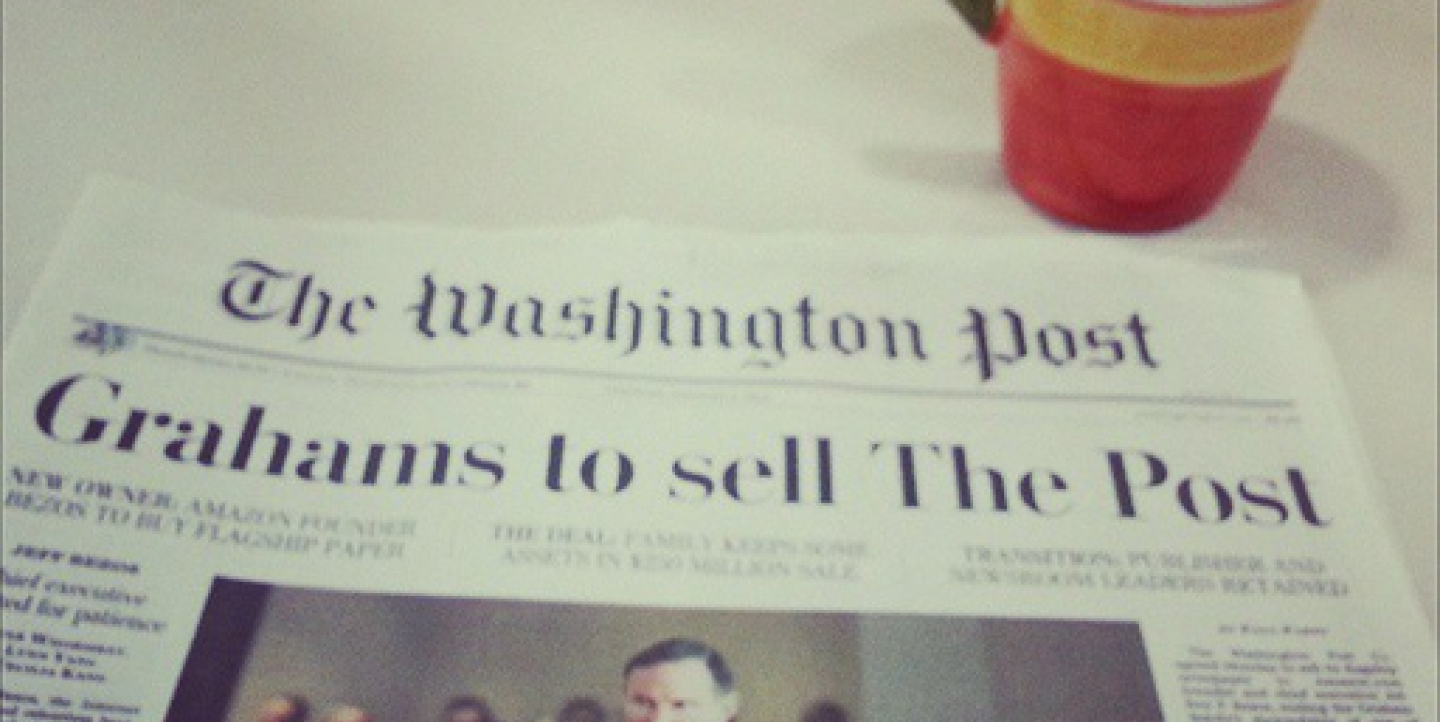The news that Amazon founder Jeff Bezos agreed to buy the Washington Post, one of the most prominent newspapers in the U.S., for US$250 million, has dominated news industry buzz this week. For many, the sale is yet another sign of journalism's shift from traditional to digital media.
Tech entrepreneur Bezos, who has played a key role in the growth of e-commerce, will purchase the paper from the wealthy family that brought the Post to prominence. Katharine Graham, whose father bought the paper at auction in the 1930s, was publisher during the Watergate scandal of the early 1970s. Post reporters Bob Woodward and Carl Bernstein's coverage of the scandal contributed to President Richard Nixon's decision to resign from office, and made the paper's name synonymous with investigative reporting.
What does the sale mean for journalism and the news industry?
"A reporter asked me whether [Bezos buying the Post] was 'an act of philanthropy.' Probably yes, but I hope it is much more than that," wrote Jeff Jarvis, associate professor of journalism at City University of New York's Graduate School of Journalism and oft-quoted media industry pundit. "I am glad Bezos is using his wealth to save a great and necessary American institution. But I hope and pray the real value he brings is his entrepreneurship, his innovation, his experience, and his fresh perspective, enabling him to reimagine news as an enterprise."
Bezos' lack of transparency with Amazon shows he is "no proponent of openness. A more secretive tech company it's hard to find," Jarvis wrote on Twitter.
After the New York Times Company sold the Boston Globe for a mere US$70 million to Red Sox owner John W. Henry, media experts wonder if we're returning to an earlier ownership model, when newspapers were owned by "rich sole proprietors," said GigaOm’s Mathew Ingram in this post. Ingram also rounds up a variety of "best insights" to the sale here.
"I would hate to think that the only way for news organizations to survive is by way of sugar daddies," Jarvis told the Guardian.
"Newspapers are now restored to their former status as playthings of the rich, rather than market-driven profit centers," Emily Bell wrote in her Guardian piece on the "marriage of old media and new money."
James Fallows of The Atlantic sees a silver lining to the sale. “So let us hope that this is what the sale signifies: the beginning of a phase in which this Gilded Age’s major beneficiaries re-invest in the infrastructure of our public intelligence,” he said.
Washington Post Co. Chairman and CEO Don Graham hopes Bezos will not only keep the newspaper afloat but help it innovate and thrive.
"The Post could have survived under the company's ownership and been profitable for the foreseeable future. But we wanted to do more than survive," Graham told the Post.
CNN's Dan Mitchell wrote that, for "anyone who cares about the public-service function of journalism, guarded optimism should be the first reaction to the astonishing news," he said. "Last year, Bezos told Fortune: 'The three big ideas at Amazon are long-term thinking, customer obsession, and willingness to invent.' Replace "customer" with "reader" and those are just the ideas the newspaper industry needs to adhere to as the highly uncertain future unfolds"
Dan Sinker, Director of Knight-Mozilla OpenNews, hopes Bezos will bring to the Post the innovative mindset he used in shepherding the creation of Amazon's cloud server, which Sinker calls one of the "most transformative and oft-overlooked technologies of the last decade."
"These spinoffs, these 'hare-brained' ideas, these bits and pieces of code that start in the newsroom and end transforming the web itself, are what technologists in journalism do best when they have the right support and leadership behind them. That leadership is still too rare in the journalism industry. That may have changed in a big way on Monday," Sinker wrote.
IJNet Editorial Assistant Margaret Looney writes about the latest media trends, reporting tools and journalism resources.
Image courtesy of Maite Fernandez.

